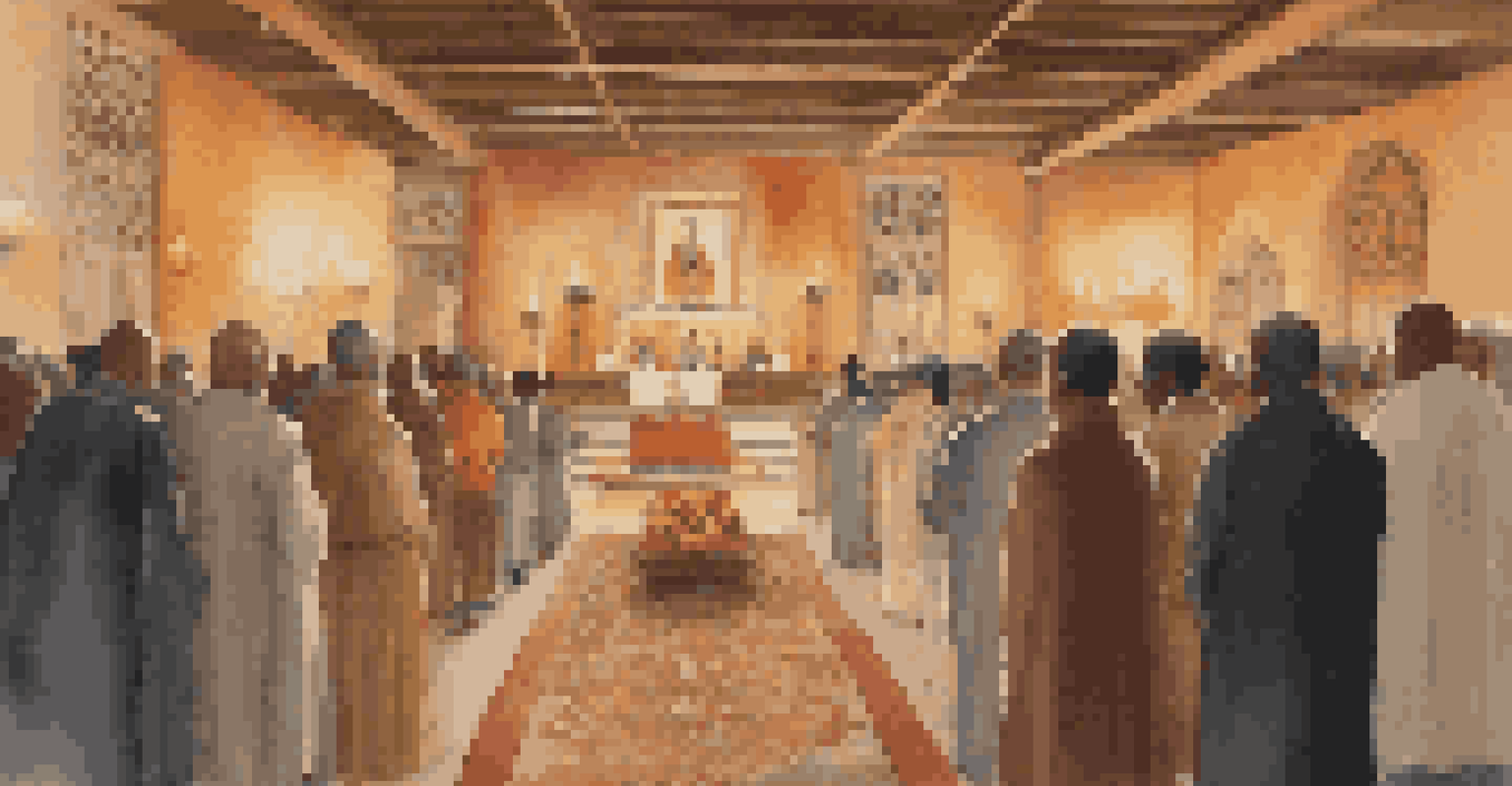Appropriate Behavior During Religious Observances Abroad

Understanding the Importance of Cultural Sensitivity
When traveling to a new country, it's essential to remember that customs and practices can vary significantly. Religious observances often hold deep meaning for locals, and demonstrating respect is crucial. Cultural sensitivity involves acknowledging and valuing these differences rather than imposing one’s own beliefs.
Traveling – it leaves you speechless, then turns you into a storyteller.
For instance, what might seem like a minor act to you could be highly offensive to someone from another culture. Engaging in conversations about local customs can provide valuable insights and foster mutual respect. This foundation sets the stage for more meaningful interactions during your travels.
By approaching your journey with an open mind and a willingness to learn, you not only show respect but also enrich your own travel experience. Each interaction becomes an opportunity to connect with others and gain a deeper understanding of the world around you.
Researching Local Customs Before You Go
Before embarking on your trip, take the time to research the religious practices and observances of the destination. This might include understanding specific dress codes, dietary restrictions, or appropriate behavior during ceremonies. A little knowledge goes a long way in avoiding unintentional faux pas.

For example, in some cultures, entering a sacred space requires specific attire, such as covering the shoulders or removing shoes. Knowing these details can prevent discomfort or embarrassment. Websites, travel blogs, and local tourism boards often provide valuable information on these customs.
Cultural Sensitivity Enhances Travel
Approaching new cultures with respect and openness fosters meaningful interactions and enriches your travel experience.
Planning ahead allows you to participate respectfully in local traditions, enhancing your travel experience. By showing that you respect their practices, you create a positive environment for cultural exchange and connection.
Dress Code: Dressing Appropriately for Religious Sites
Many religious sites have specific dress codes that visitors are expected to follow. Understanding these requirements is crucial for showing respect to the local customs. For instance, women may need to cover their hair or wear long skirts, while men might be required to wear long pants and shirts with sleeves.
The beauty of the world lies in the diversity of its people.
Ignoring dress codes can lead to being denied entry or creating an uncomfortable situation for both you and the locals. It's always best to err on the side of caution and dress conservatively when visiting religious sites. This not only shows respect but also enhances your overall experience.
If you're unsure about what to wear, consider visiting forums or seeking advice from locals before your visit. This small step can make a significant difference in how you're perceived and can lead to a more enjoyable experience.
Participating in Religious Ceremonies with Respect
If you have the opportunity to attend a religious ceremony, approach it with a respectful mindset. This means being mindful of your behavior, avoiding distractions like loud conversations or phone use, and following the lead of those participating. Observing quietly can often be the best way to appreciate the significance of the event.
For example, during a prayer session, it’s respectful to silence your phone and refrain from taking photos unless explicitly allowed. Engaging in the ceremony can also be a great way to connect, but always ensure your participation aligns with local expectations. Asking for guidance from locals can be helpful in these situations.
Research Local Customs Before Travel
Understanding specific dress codes and customs can help avoid unintentional offenses and enhance cultural exchange.
Your willingness to engage respectfully not only enhances your understanding but also demonstrates an appreciation for their culture. This can lead to deeper connections and shared experiences that you’ll remember long after your travels.
Communicating Respectfully in Religious Contexts
When discussing religion with locals, be aware of your language and tone. Religious beliefs can be sensitive topics, so approach conversations with curiosity rather than judgment. Asking questions and expressing genuine interest can lead to enlightening discussions without coming across as intrusive.
For example, instead of making assumptions about someone’s beliefs, ask them about their practices and what they mean to them. This shows that you respect their perspective and are open to learning. Avoid controversial topics unless you’re certain it’s appropriate to discuss.
By fostering respectful dialogue, you create a safe space for sharing experiences and insights. This not only enhances your understanding but also builds bridges between cultures, enriching your travel experience.
Handling Differences in Religious Beliefs
Traveling exposes you to a variety of beliefs and practices that may differ significantly from your own. It's essential to approach these differences with an open mind and a respectful attitude. Understanding that everyone has their own journey can help you navigate conversations and interactions with grace.
For instance, if you encounter beliefs that challenge your own, take a moment to reflect rather than react defensively. You might find common ground in shared values, even amidst differing practices. This approach not only fosters respect but can also lead to meaningful exchanges.
Reflect on Experiences Post-Trip
Taking time to reflect on your travel experiences can deepen your appreciation for cultural diversity and influence your personal growth.
By embracing diversity and showing understanding, you contribute to a more harmonious travel experience. Remember that every culture has its unique beauty, and appreciating these differences enriches your worldview.
Reflecting on Your Experiences After the Trip
After returning from your travels, take some time to reflect on your experiences with religious observances. Consider what you learned about the local culture and how it might influence your own beliefs and practices. This reflective process can deepen your appreciation for the diversity of the world and the richness of human experience.
Sharing your experiences with friends and family can also promote understanding and respect for other cultures. By recounting your journey, you help to bridge cultural gaps and encourage others to approach travel with an open mind.

As you reflect, think about how you can incorporate the lessons learned into your daily life. Whether it's adopting a more respectful attitude towards differing beliefs or simply being more open to learning, these insights can lead to personal growth long after your travels have ended.